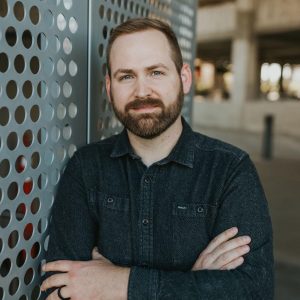Benjamin Cremer experienced a call to ministry when he was 7 years old. He never could have imagined his congregation would be an online community of people fleeing toxic faith.
Raised in extreme fundamentalism in Boise, Idaho, Cremer today seeks to be a bridge between where he’s come from and where he has landed. His platform is social media and Substack.
“I really feel like God is doing a huge reformation in the church right now,” he said in an interview. “And one of the spaces the church has not fully arrived is online. I really want to be part of where I feel like the Holy Spirit is leading next, whether it’s short term or long term.”

Benjamin Cremer
His hope, he said, is to build “a collective movement of cells throughout the United States that are at least having these conversations in an authentic, healing way in that intersection between politics and our faith so that we can … heal our Christian reputation throughout the nation.”
Cremer has a natural way with words. His social media posts are pithy, quotable and sharable. As a result, they get passed around Facebook and X and other platforms rapidly.
For example: “When gentleness starts to sound like a weakness to us Christians rather than a fruit of the Spirit, that’s when we know power has become an idol for us.”
He posts three or four such sharable thoughts every week, with links to his longer writing on Substack and his weekly newsletter that delves deeper into faith and politics and culture.
In a recent post he wrote: “It was such a sobering and humbling experience to develop friendships with those whom I considered to be the ‘them’ in my ‘us vs them’ mentality. I honestly grieve every day how shallow, ignorant and unloving my beliefs were about others.”
He gives away his work for free, with an opportunity for readers to support him financially if they choose to do so. His inbox is full of messages every day from people who want to engage in conversation, tell him how wrong he is or thank him for his work.
 “One of the things I’ve been so surprised by in my work is in the last two weeks, I’ve had four people reach out to me in various parts of the United States who are stepping into local politics precisely because of what I have been writing,” he said. “They want to represent, they feel like they can hold onto their faith and step into the positions they’re stepping into for direct humanitarian reasons. And that has just been really life giving to me to see those positive changes happen.”
“One of the things I’ve been so surprised by in my work is in the last two weeks, I’ve had four people reach out to me in various parts of the United States who are stepping into local politics precisely because of what I have been writing,” he said. “They want to represent, they feel like they can hold onto their faith and step into the positions they’re stepping into for direct humanitarian reasons. And that has just been really life giving to me to see those positive changes happen.”
Locally, he’s been invited to speak with some Idaho legislators — “Republicans who are wanting to be able to talk with their far-right colleagues. They don’t know how to really speak with them,” he said. “And so it’s really opening some avenues there that I’d really like to cultivate and at least build some connectivity. People just don’t have the resources to have these kind of conversations over hot-button issues with people who feel so diametrically different. They’re in a different ideological world. And so I just see my work, at least for right now, as trying to bridge that gap between those two worlds.”
He knows both worlds because he has lived in both worlds.
Raised in a rural part of Idaho, he was homeschooled in a co-op with ties to the same Christian movement that led to the founding of the Aryan Nations.
Later, his family moved to a nondenominational evangelical church, “but it was kind of undistinguishable to my young mind, same kind of rhetoric from the pulpit — nationalism and fear in that church,” he said. “But I felt called to be a pastor when I was around 7 years old and couldn’t shake it.”
“I knew what unhealthy church looked like, and I didn’t want to perpetuate that.”
However, “I knew what unhealthy church looked like, and I didn’t want to perpetuate that,” he explained. “So I pursued ministry training at Northwest Nazarene University, read Wesley somewhere along the way and said, ‘You know what? This doctrine of grace, if I could advocate that, I think I can make this work. And so I found myself in the Wesleyan theological tradition through the Church of Nazarene.”
He spent about 20 years there and in Methodist churches until last December, when he took his own leap of faith to begin full-time work as a digital pastor.
That journey began in 2019 when he wrote a “public lament about what I felt like evangelical Christianity trained me to be and what I’m seeing it without,” he explained. “And that really seemed to resonate with a lot of people. … I realized people who would message me or email me, they were just so open and vulnerable about where they’re at with spiritual pain, so much more than the local church. So I felt like I was doing more pastoring online than I was even in the local church. And that’s really what I felt called to do and be.”
 That was a sharp contrast to the local church where, at the time, he had been in a three-hour board meeting dedicated to “arguing over the organ music and carpet.”
That was a sharp contrast to the local church where, at the time, he had been in a three-hour board meeting dedicated to “arguing over the organ music and carpet.”
“The very next day, I had five people over email and in messages talk to me about their spiritual problems. It was an atheist and agnostic, somebody from a different religion, but also really hurt Christians who were actually being able to bring life and healing and compassion into their lives and see changes happen.”
Then this kept happening, he continued. “The more I would write and the more people followed — and with what I was doing in the local church and all the stuff I was being harmed by and what I saw people being harmed by — I just couldn’t make the two worlds fit until ultimately, after a lot of prayer and talking with my wife, we just felt like this is where God was leading me into the next chapter.”
Now, a primary inspiration for his writing is “what I would want to say to my former self,” he said. “I was as hard line, as far right as you can imagine, especially before my ministry education. I held extremely hyper-conservative views on every moral and cultural issue.”
Most of the time, he writes something down and then waits 24 hours before posting it — “because I don’t want to be reactionary. I really want to be reflective in what I’m writing about the current moment.”
Yes, he gets hate mail amid those seeking genuine conversation. But that was true in the church as well, he said. “When I stepped into my last pastoring gig here in Boise, I had four calls from my resignation within the first week because of something I had tweeted about the vaccine and our desire to put the interests of others above ourselves, and just encouraging people to get vaccinated if they can.”
Boise may seem like an unlikely place for a progressive Christian voice to originate. The city and state are decidedly fundamentalist. One of the most well-known fundmamentalist voices in American Christianity today is Doug Wilson, who is based in Moscow, Idaho.
Cremer said learning Idaho history as a child helps him understand the reality of where he lives.
 “We were a satellite state for Confederates who were leaving the Civil War, and they’re actually the ones who kind of started a lot of the mining here,” he said. “And they intentionally wanted Idaho to be a white dominant, limited-government, agriculturally driven state. Lincoln had to come here and establish Fort Boise to suppress the Confederacy here in Idaho.”
“We were a satellite state for Confederates who were leaving the Civil War, and they’re actually the ones who kind of started a lot of the mining here,” he said. “And they intentionally wanted Idaho to be a white dominant, limited-government, agriculturally driven state. Lincoln had to come here and establish Fort Boise to suppress the Confederacy here in Idaho.”
According to U.S. Census data, Idaho is 93% white. The Southern Poverty Law Center has documented 21 extremist hate groups in the small state.
“The United Methodist Church I served was more than 150 years old, and we had a stained-glass window with Robert E. Lee in the cathedral, and we have mountains named after Confederate captains and numerous places that are named after people in the Confederacy,” Cremer noted.
So when readers from across the country write to Cremer about the challenges they face in talking with family members and friends about faith and politics, he understands. He lives there and grew up in that.
“There’s a desperate need for pastors such as myself or spiritual directors to fulfill that online space where people feel like they can safely come and share their wounds,” he said. “And so that’s what I find is the majority of my work every day online is helping people in the midst of those situations.”


